De Nigeriaanse dichter en schrijver Chinua Achebe werd geboren op 16 november 1930 in Ogidi. Zie ook alle tags voor Chinua Achebe op dit blog.
Remembrance Day
Your proclaimed mourning
your flag at half-mast your
solemn face your smart backward
step and salute at the flowered
foot of empty graves your
glorious words-none, nothing
will their spirit appease. Had they
the choice they would gladly
have worn for you the same
stricken face gladly flown
your droopéd flag spoken
your tremulous eulogy-and
been alive. . . . Admittedly you
suffered too. You lived wretchedly
on all manner of gross fare;
you were tethered to the nervous
precipice day and night; your
groomed hair lost gloss, your
smooth body roundedness. Truly
you suffered much. But now
you have the choice of a dozen
ways to rehabilitate yourself.
Pick any one of them and soon
you will forget the fear
and hardship, the peril
on the edge of the chasm. . . . The
shops stock again a variety
of hair dyes, the lace and
the gold are coming back; so
you will regain lost mirth
and girth and forget. But when,
how soon, will they their death? Long,
long after you forget they turned
newcomers again before the hazards
and rigors of reincarnation, rude
clods once more who once had borne
the finest scarifications of the potter’s
delicate hand now squashed back
into primeval mud, they will
remember. Therefore fear them! Fear
their malice your fallen kindred
wronged in death. Fear their blood feud;
tremble for the day of their
visit! Flee! Flee! Flee your
guilt palaces and cities! Flee
lest they come to ransack
your place and find you still
at home at the crossroad hour. Pray
that they return empty-handed
that day to nurse their red-hot
hatred for another long year. . . .
Your glorious words are not
for them nor your proliferation
in a dozen cities of the bronze
heroes of Idumota. . . . Flee! Seek
asylum in distant places till
a new generation of heroes rise
in phalanges behind their purified
child-priest to inaugurate
a season of atonement and rescue
from fingers calloused by heavy deeds
the tender rites of reconciliation.
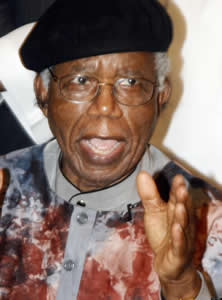
Chinua Achebe (Ogidi, 16 november 1930)
De Nederlandse schrijver Anton Koolhaas werd op 16 november 1912 in Utrecht geboren. Zie ook alle tags voor Anton Koolhaas op dit blog.
Uit: Mijnheer Tip is de dikste mijnheer
“Toen Tip weer op vier poten stond, begon hij met Ferry eens goed ondersteboven te lopen. Het gaf een doffe dreun toen ze botsten, maar Tip had niet genoeg kracht gezet en Ferry bleef overeind. ‘Het is de dag van de tulpenbol en de dwaze windhandel, jongens,’ riep Tip en op hetzelfde ogenblik was het hele dozijn andere varkens ook op de poten en begonnen de veertien varkens driftig door het hok te sjokken, waarbij zij telkens botsten, steunden, draaiden en elkaar soms behendig ontweken. De grap was nu dat men met zijn vieren of vijven in de hoek van het hok terecht moest zien te komen en dan ging men daar net doen, of men er niet meer uit kon geraken. Ferry en Tip moesten dan die knoop ontwarren en dat was altijd zo leuk, want ze riepen dan commando’s die erg gek klonken. ‘Hijs die schele uit de oliestook,’ riep
Ferry en hij gaf Simon Artzt (het dikste varken van de ploeg) een peut in de buik zodat Simon, gierend van de pijn die hij voorwendde, achteruit stoof tot helemaal achter in het hok, waar hij dan met zijn dikke achterste tegen de muur stuitte. Dat gaf dan zo’n geweldige klets, dat iedereen zich een ongeluk lachte.
(…)
Tip en Ferry gingen nu samen aan de gang om hem opnieuw uit de klont te krijgen en daartoe begonnen ze in de achterste plooi van zijn oor, daar waar dat overging in zijn nek, te knagen en gekke dingen te zeggen als: ‘Snoepscheuten lopen de spuigaten uit,’ en ‘Altijd is Kortjakje ziek, op poten en op vleugels’ en Simon Artzt werd daar zo krieuwelig en zo week van, dat hij begon te kwijlen en te smakken en dan gooide hij zich met een ruk omhoog, trappelde draaiend en met de voorpoten over de ruggen van de makkers die hem insloten heen, tot hij los was en in zijn eentje midden in het hok stond. Dan riepen allen tegelijkertijd:
‘Dikke boems de biggenknijper
Kan niet door de puntenslijper.”
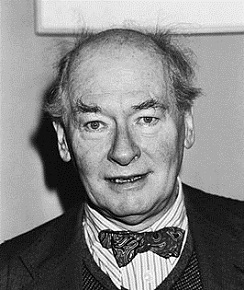
Anton Koolhaas (16 november 1912 – 16 december 1992)
De Portugese schrijver José Saramago werd geboren op 16 november 1922 in het dorpje Azinhaga in de provincie Ribatejo. Zie ook alle tags voor José Saramago op dit blog.
Uit: Baltasar and Blimunda (Vertaald door Giovanni Pontiero)
“The machine has stopped climbing and hovers in the sky, its wings extended, its beak pointing northward, and it has every appearance of being motionless. The priest opens the sail a little more, three-quarters of the amber balls are already covered in shadow, and the machine starts to descend gently, it is like sailing across a tranquil lake in a small boat, a tiny adjustment to the rudder, a stroke with one oar, those little touches that only mankind is capable of inventing. Slowly, land begins to appear, Lisbon looms into sight, the uneven rectangle of the Palace Square, the labyrinth of streets and alleyways, the frieze of the veranda where the priest lives and where even now the officers of the Holy Office of the Inquisition are forcing an entry to arrest him, they have come too late, officers who are so scrupulous in the affairs of heaven, yet who forget to look up at the blue sky, where they would see the machine, a tiny dot in the remote distance, but how could they raise their eyes when they are confronted, to their horror, with a Bible whose pages have been torn out at the Pentateuch, when they are confronted by the Koran reduced to indecipherable fragments, they leave at once and head for the Rossio and the headquarters of the Holy Office of the Inquisition to report that the priest they had gone to arrest has already escaped, and it never occurs to them that he has taken refuge in the great celestial dome, which they will never know, because it is quite true that God has a weakness for madmen, the disabled, and eccentrics, but most certainly not for officers of the Holy Office of the Inquisition. The Passarola descends a little further, until the estate of the Duke of Aveiro comes into sight, and these three fliers are clearly beginners, they lack the experience that would enable them to distinguish important landmarks at a glance, rivers and streams, lakes, villages sprinkled like stars on earth, dense forests, they can see the four walls of the coach-house, the airport from which they launched their flight, Padre Bartolomeu Lourenço suddenly remembers that he has a spyglass in the chest, he fetches it at once and trains it downwards, ah, how wonderful to be able to live and invent things, he can now distinguish the pallet in the corner, and the forge, but the harpsichord has disappeared,…”
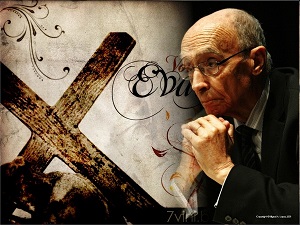
José Saramago (16 november 1922 – 18 juni 2010)
De Nederlandse schrijfster en journaliste Renate Rubinstein werd geboren op 16 november 1929 in Berlijn. Zie ook alle tags voor Renate Rubinstein op dit blog.
Uit: Links en rechts in de politiek en in het leven
“Wat is eigenlijk een linkse intellectueel? Dat is niet iemand die communist is, want zover hoef je beslist niet te gaan, maar het is wel iemand die niet anticommunist is. Jean Paul Sartre in Frankrijk, Harry Mulisch bij ons, Noam Chomsky in Amerika, zijn van die instelling illustere voorbeelden. ‘Quand on était anticommuniste de manière resolue, on était catalogué à droite. Bon. Ceux qui ne voulaient pas être classés à droite, qui voulaient rester à gauche, ont cherché de manière désespérée, pour ainsi dire, à ne pas être communistes et à ne pas être anticommunistes,’ schrijft Aron. Hij had het over de jaren dertig en over de jaren vijftig, maar nog steeds is de verleden tijd niet van toepassing op het verschijnsel. Die afkeer van het anticommunisme gaat op zijn minst terug tot de tijd van Stalins showprocessen in de jaren dertig, toen twijfel aan de schuld van Boekarin betekende dat men Stalin afviel en daarmee ‘objectief’ Hitler steunde. En Hitler was voor onze wereld in die jaren en tot aan 1945 het urgentste gevaar. Tegen dat gevaar sloten de democratieën een bondgenootschap met hun andere aartsvijand, de àndere totalitaire macht die, net als zij, bedreigd werd door de eerste. Ze hebben loyaal hun hulp verleend, ze hebben zich na de overwinning aan de afspraak gehouden die voor beide partijen had moeten gelden, en zich uit de landen die ze bevrijd hadden teruggetrokken. Maar ze bleven met de Sovjetunie in die staat van koude oorlog die de natuurlijke relatie is tussen de beide systemen. En hoe succesvol de vernietiging van het nationaal-socialisme ook geweest is, tot op de dag van vandaag vervult in het linkse milieu het fascisme zijn rol als boeman tegen het anticommunisme. Er zit in deze ontwikkeling iets raars, iets dat ik niet begrijp, een behoefte aan legitimatie, een merkwaardig soort schuldgevoel, een heimwee misschien naar tijden waarin goed en kwaad nog samenvielen met links en rechts, waardoor onze wereld overzichtelijk was.”
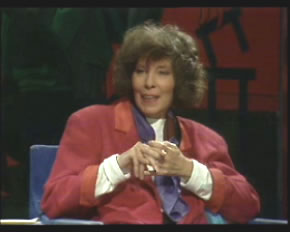
Renate Rubinstein (16 november 1929 – 23 november 1990)
De Amerikaanse dichter Craig Arnold werd geboren op 16 november 1967 in Temple, Californië. Zie ook alle tags voor Craig Arnold op dit blog.
Mulberry
You have towered here
leaning half over the wall
all my awareness
years before I knew
what silkworm was or China
I felt your berries
pulp under my feet
tracked your purple all over
grandmother’s carpet
a sapling planted
by some sea captain to make
shade for a future
This winter you lost
one of your long low branches
to a backed-up car
and the old woman
who has known you all her life
wept at the split wood
Your bark is wrinkled
more deeply than any face
you live so slowly
do our voices sound
to you like the fluttering
of paper moth wings
do we seem rootless
holding fast to the anchor
of the saddest things
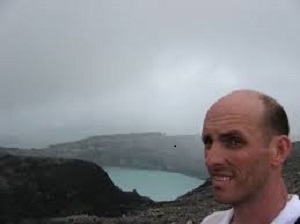
Craig Arnold (16 november 1967 – 27 april 2009)
De Schotse schrijver, humorist, radio-en televisie presentator Daniel Frederick Wallace werd geboren op 16 november 1976 in Dundee. Zie ook alle tags voor Daniel Wallace op dit blog.
Uit: Friends Like These
« Surely not. I wasn’t a man. I was a boy. I had a silly, ungrown-up job, for starters – writing columns and hosting quiz shows.
But steadily, the tremors got stronger. We started buying fresh bread. We visited a farmers’ market and bought some olives, despite the fact that very few local farmers in this part of London have ever actually farmed an olive.
I wanted to talk to Lizzie about what was happening, but she seemed so comfortable, so at ease with this slide into domesticity, that it never seemed the right moment.
Then she brought home some display cushions. Not for bottoms, for display only. She also bought some sticks which she stuck in a jar and convinced me were a ‘dramatic focal point’ for our living room.
I smiled and hid the copy of Kung Fu Soccer I’d bought that afternoon in HMV. In the evening, I poured out my heart over a pint with my mate, Ian.
‘What’s happening to me, Ian?’ I asked. ‘I don’t want to be one of those men you see wandering around Ikea or the linen section of John Lewis. You know the ones – lost souls who discuss congestion charging and wear jeans with elasticated waists.’
‘It nearly happened to me,’ said Ian, heavily. And then, with real gravitas: ‘I even bought a juicer.’
I remembered that. He’d drunk nothing but carrot juice for six weeks and his elbows turned yellow.
‘I managed to pull back from the brink,’ said Ian. ‘That’s what you have to do. Before you become a Stepford Man.’
‘What if it’s too late?’ I said, panicked and nervy. ‘What if I’ve already become one of Them? Just the other day . . . God, I can’t believe I’m going to tell you this . . .’
Ian closed his eyes and waved me on.
‘I saw a girl walking through town. I could see her midriff, and . . .’ Ian leaned forward. ‘And I tutted, Ian. I bloody tutted.’
‘You tutted?’ He was outraged. This was worse than he thought.

Danny Wallace (Dundee, 16 november 1976)
Zie voor nog meer schrijvers van de 16e november ook mijn vorige blog van vandaag.
